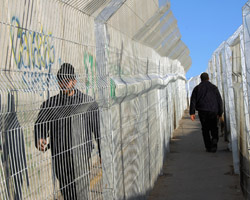The HyperTexts
In the Shadow of Rachel's Tomb
the story of Arlette and George Anastas and family
with an introduction by Michael R. Burch, editor of
The HyperTexts
“A voice was heard in Ramah,
Lamentation and bitter
weeping,
Rachel weeping for her children,
Refusing to be comforted for her children,
Because they are no
more.”
Lynn Grassmeyer, a third generation Palestinian-American Christian, recently
traveled to Palestine for humanitarian reasons (she works for children's rights)
and also to explore her family's Palestinian roots. While in Palestine she
visited Bethlehem, the site of Rachel's Tomb and also the much-celebrated
birthplace of Jesus Christ. To Lynn's dismay, the government of Israel has
erected a nine-meter (30-foot) wall there, making Palestinians in the area feel
as if they're living inside a tomb. Rachel was the beloved wife of the
patriarch Israel, who gave his name to the people. One wonders what the mother
of Israel would think about innocent children being born, growing up and dying
in the shadow of that entombing wall, without ever having lived as free men and
women? The letter below, forwarded to me by Lynn Grassmeyer, is the testimony of
one Palestinian family that lives in the shadow of that horrendous wall.

Palestinians must navigate a 30-foot-high security wall in
order to enter Bethlehem.
We (Arlette and George Anastas) are a Palestinian civilian
family living opposite Rachel's Tomb in Bethlehem.
We have five children: four girls and one boy. We live in a
building surrounded on three sides by a nine-meter-high wall; only one side is
open, with barely any sun coming through it. As we live nearby Rachel's Tomb our
house is subject to severe military measures; our shops are located below in the
building, they are closed and there's no business in front of our house. Our
street used
to be the main street of Bethlehem and our neighborhood was once the richest and liveliest area of
Bethlehem, but now it is a small and scary place without neighbors. We are
imprisoned and buried alive in our own tomb.
During the years of the second Intifada we experienced much pressure
and in 2002 there was a lot of shooting: we lived in a crossfire with high
positions around our house. The area was occupied by Israeli soldiers and shots
came from different directions. My children were paralyzed by fear.
During the shootings, bullets entered our house and we
didn't know where to hide or where to go. The situation lasted one year.
It is horrible to live in the shadow of a nine meter wall. The main
problem is that my children suffered a lot and even now they don't feel that they have
a future. The wall was erected in just one day, but it has long-lasting
implications for our lives.
What bothered me most is that I couldn't defend my house or
even do anything. I had bad feelings about everything: about work, life, and
everything that concerned the wall.
My children were so shocked they were afraid to go out and look
at it.
When I (Arlette) returned back from Jerusalem that day (I
had left at six in the morning because of long delays at the checkpoints) and
saw the wall, it
was a horrible shock.
I started crying and asked my husband what was going on. He told me that the men building the wall
had worked cheerfully. I was in a state of shock for two months, then finally
managed to muster the strength to go on for the sake of my children.
My daughter Amanda is the eldest and remembers how the wall
destroyed her life. "I was fourteen years old and wanted to do a lot of things,
but I couldn't find an open door to walk through and am still feeling sad and
depressed."
My daughter Lara is eighteen years old and remembers that after the
segregation wall was built we were psychologically harmed. "Now I just can't
feel any joy inside my parents. I can't feel joy myself. There's no peace
― my
house is like a dead zone. I worry about my future, what will happen when I
finish my school?"
But we will not leave our hometown just for the wall.
It's our place, the place where Jesus was born, and we are
lucky to live here.
After all this I started to think about my children 's future,
so I started an on-line business. We make garments for infant baptism and sell
them on-line to Christians worldwide. They appreciate baptism garments from
Bethlehem, where Jesus was born. My attitude went from being stuck, to being
angry, to acting. I hope this story will help others.
Best Regards!
Arlette
The HyperTexts
